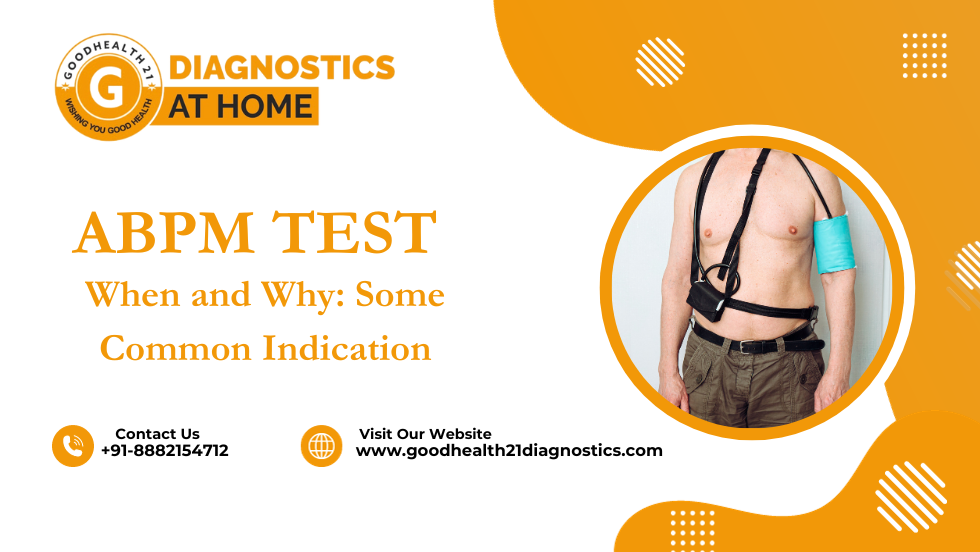Monitoring one’s blood pressure is crucial for maintaining good health, and while traditional blood pressure checks at your doctor’s office are informative, they may not always provide a comprehensive view of your blood pressure throughout the day. This is where Ambulatory Blood Pressure Monitoring (ABPM) comes into play. ABPM is a valuable diagnostic tool that offers a more detailed and accurate assessment of your blood pressure. In this blog post, we will explore the indications for ABPM, explaining when and why you might need this test to better understand your cardiovascular health
Understanding ABPM
Ambulatory Blood Pressure Monitoring (ABPM) is a non-invasive technique that involves wearing a specialized blood pressure monitor for a 24-hour period. Unlike the sporadic measurements taken during a typical visit to the doctor’s office, ABPM provides continuous data on your blood pressure, recording it at regular intervals throughout the day and night. This extended monitoring allows healthcare professionals to evaluate your blood pressure patterns in real-life situations, which can be more informative than isolated measurements.
The ABPM device is a compact and portable unit that includes a cuff and a small monitor. The cuff is worn around your upper arm and is connected to the monitor, which automatically inflates and deflates the cuff to record your blood pressure at predetermined intervals. The recorded data is then analyzed to provide a comprehensive profile of your blood pressure over the monitoring period.
Common Indications for ABPM
- Suspected White Coat Hypertension: White coat hypertension refers to a situation where your blood pressure is elevated only in a medical setting, such as a doctor’s office, due to anxiety or stress. ABPM can help differentiate between white coat hypertension and sustained high blood pressure.
- Masked Hypertension: This condition is the opposite of white coat hypertension. Here, your blood pressure appears normal during a clinical visit, but it is elevated in everyday life. ABPM can detect masked hypertension, which may be missed during routine office visits.
- Resistant Hypertension: For individuals with high blood pressure that remains elevated despite treatment, ABPM can provide insights into their condition. It helps healthcare professionals understand whether blood pressure is well-controlled outside of the clinical setting
- Evaluating Antihypertensive Medications: ABPM is valuable for monitoring the effectiveness of medications in managing hypertension. It helps healthcare providers determine if a prescribed treatment plan is working as expected.
- Assessment of Blood Pressure Variability: Monitoring blood pressure throughout the day with ABPM can reveal the extent of variability in your readings. High variability may be associated with an increased risk of cardiovascular events.
- Dipping Status: Normal blood pressure typically experiences a dip during sleep. Some individuals, however, do not experience this dip and may have non-dipping or reverse-dipping patterns. ABPM can identify these patterns, which may have implications for cardiovascular health.
- Assessment of Hypertensive Heart Disease: ABPM can provide valuable information about the impact of high blood pressure on the heart. This is important for diagnosing and managing hypertensive heart disease.
- Assessment of Hypotensive Symptoms: In some cases, individuals may experience symptoms of low blood pressure, such as dizziness or fainting. ABPM can help determine if these symptoms are related to blood pressure changes.
- Risk Assessment: If you have risk factors for hypertension or cardiovascular disease, your healthcare provider may recommend ABPM to assess your current blood pressure status and identify any underlying issues.
- Evaluation of Lifestyle Changes: For individuals making significant lifestyle changes to improve their blood pressure, ABPM can provide objective data on the effectiveness of these changes over a 24-hour period.
In conclusion, Ambulatory Blood Pressure Monitoring (ABPM) is a valuable tool for assessing and managing blood pressure. If you or your healthcare provider suspect any of the conditions mentioned above or if you are simply looking to gain a more comprehensive understanding of your blood pressure patterns, ABPM can be a highly informative test.

